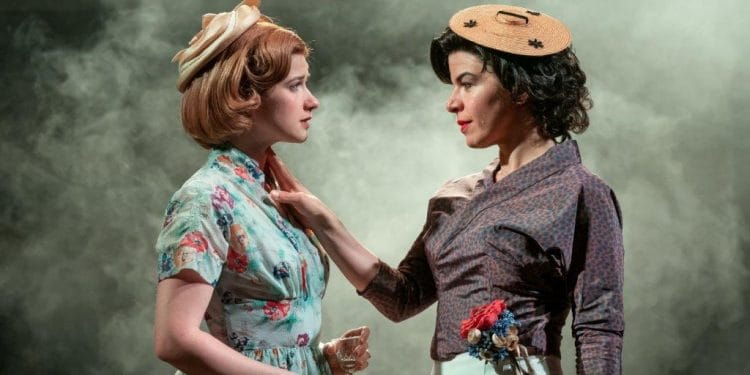 There’s a line in Henrik Ibsen’s A Doll’s House which seems to capture the spirit of Samuel Adamson’s Wife at the Kiln Theatre; “You see, there are some people that one loves, and others that perhaps one would rather be with.” But that’s not the only link to one of the most performed plays in history, A Doll’s House is the glue which binds Wife together as it spans different generations of the same family across many decades.
There’s a line in Henrik Ibsen’s A Doll’s House which seems to capture the spirit of Samuel Adamson’s Wife at the Kiln Theatre; “You see, there are some people that one loves, and others that perhaps one would rather be with.” But that’s not the only link to one of the most performed plays in history, A Doll’s House is the glue which binds Wife together as it spans different generations of the same family across many decades.
Wife begins as Nora slams the door, or more specifically as an actress playing Nora makes her famous exit. Moments later we’re in the dressing room and the first of four stories unfolds. It’s 1952 and we’re reminded that if the actress and her lover were men they’d be facing five years in prison, this play captures the struggles of the LGBTQ+ community in each of the eras it visits, as well as examining the institution of marriage. In 1988 two men face the stigma of being gay in very different ways, but both against the backdrop of the AIDS crisis.
It’s not until 2019 that we start to see the links between each story, here views of homosexuality have changed, but perhaps not enough; “we had a wedding, not a gay one, a Shoreditch one.” By 2042, the overlap in stories is clear and the missed opportunities of previous generations exposed. Director, Indhu Rubasingham, has taken these interconnected stories and given them all a unique feel, while retaining their common bonds.
Adamson’s writing is beautifully skillful, weaving each of these tales together, intriguing the audience without baffling them. There are nods to Adamson’s native Australia as well as recurring motifs; the tambourine, Enoch Powell and an unfortunate wig lady amongst them. It all combines to create a modern masterpiece which is as joyful as it is emotional.
Richard Kent’s design is stunning, especially as we transition from one era to the next. The 1988 production of A Doll’s House is all Scandinavian Noir, while the 2019 one, gender switched of course, is loud and colourful. It’s not just in Suzannah’s dressing room set that we see a glimpse of ‘backstage’, the heart of theatre beats for all to see, even if by 2042 things aren’t looking good for the industry.
The cast double up on roles as we move in to new eras. Sirine Saba as Suzannah is usually Nora, and Saba does an incredible job of bringing a different part of Nora to Suzannah in each iteration, while Karen Fishwick explores a range of emotions in her portrayal of both Daisy and Claire. Calam Lynch tackles two of the most diverse roles. In 1988 he’s closeted and insecure Eric, but in 2019 he switches to a flamboyant Cas, it’s a truly outstanding performance from Lynch.
This play is that kind of rare piece of work which speaks to so many. Written with such intricate detail and so beautifully staged that it feels like a great modern epic waiting to be discovered. Wife may have based itself around A Doll’s House, but it stands on its own as a towering example of pivotal theatre.























